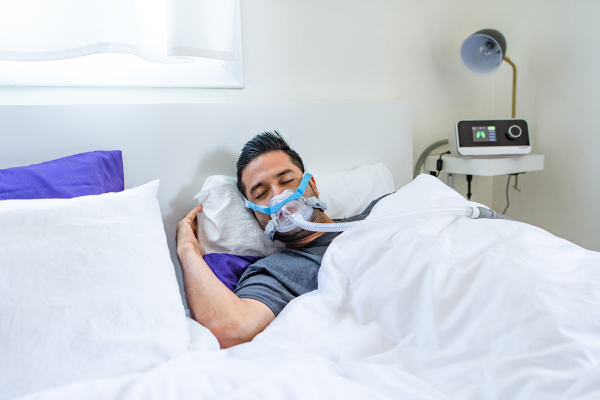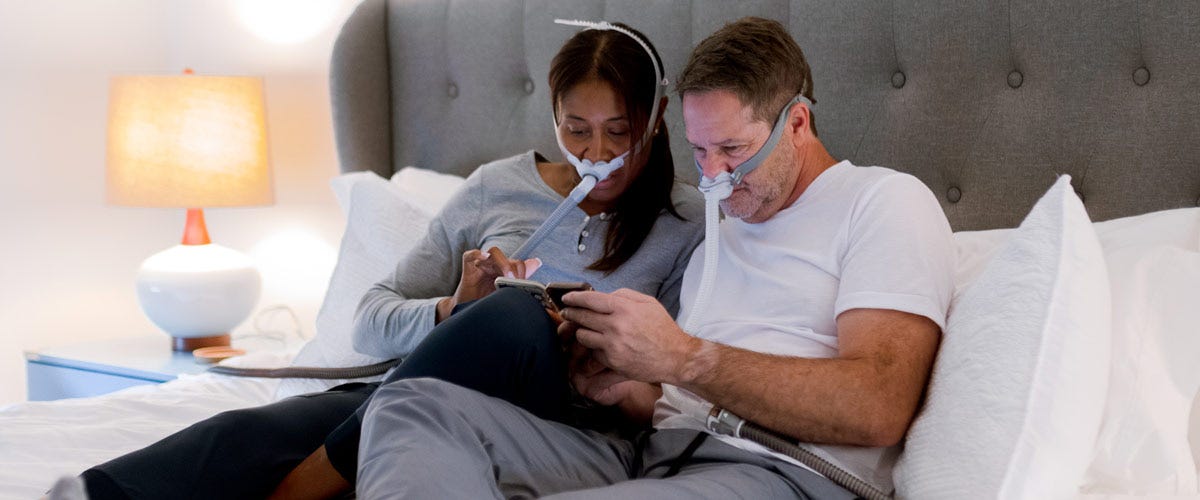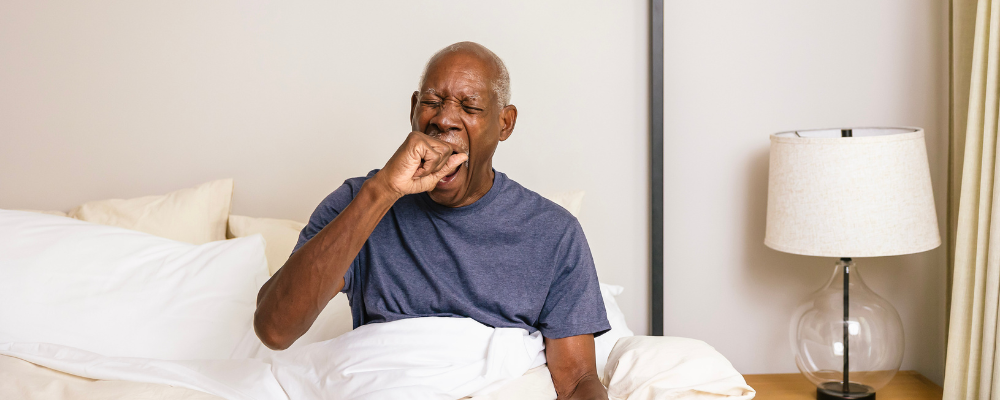Simply put, sleep apnea is a disorder where someone stops breathing during sleep. The term applies to 3 different types of sleep apnea: obstructive sleep apnea (OSA,) central sleep apnea (CSA,) and mixed sleep apnea. In today’s blog, we’ll define all 3 types of sleep apnea, discuss their causes and symptoms, and reveal how Aeroflow Sleep has effective therapies to treat every one.
What Is Obstructive Sleep Apnea (OSA?)
The first and most common type of sleep apnea is obstructive sleep apnea (OSA.) It is caused by your upper airway being—as the name suggests—obstructed, and that prevents you from breathing during sleep. The obstruction may be due to enlarged tonsils or adenoids, excess fat around the neck, or the tongue blocking the airway when relaxed.
Patients who have sleep apnea also have chronic daytime sleepiness, morning headaches, dry mouth, sore throat, and irritability or mood swings. These sleep apnea symptoms may be seen within all types, but being overweight and loud snoring are two symptoms that are often seen within OSA specifically, due to the obstruction.
For example, if you have a BMI over 30, you are more likely to have excess fat around your neck, and when you sleep, gravity, along with the fatty tissue, contributes to cutting off airflow, causing hypopneas (or short pauses in breathing.) Then, snoring happens when your body tries to push air around the obstruction; the fatty neck tissue compressing your upper airway. However, snoring does not always result in a sleep apnea diagnosis; it can also be caused by something temporary; such as a cold, with post nasal drip and upper airway inflammation.
It’s important to speak to your doctor about the possibility of having sleep apnea before diagnosing yourself, because your symptoms may be the cause of something else.
What Is Central Sleep Apnea (CSA?)
Central sleep apnea (CSA) is less common. It occurs when the brain—a key part of your central nervous system—fails to signal your muscles to breathe while sleeping. Additionally, people with CSA have long pauses in their breathing, known as apneas, which may last up to 2 minutes. These disruptions in sleep certainly can affect your sleep schedule and normal circadian rhythms, which cause the universal sleep apnea symptom of excessive daytime sleepiness.
Interestingly, patients with CSA may also have insomnia, which is when you have difficulty falling asleep or—more likely for those who have sleep apnea—have trouble staying asleep. When you wake gasping for air or choking in the middle of the night, you won't want to fall back asleep, but then you don't receive the sleep quality you need. Insomnia is its own sleep disorder, so again, patients need to speak with their primary care physician about the differences and treatments.
What Is Mixed Sleep Apnea?
Finally, mixed sleep apnea (sometimes called complex sleep apnea) is a combination of both OSA and CSA. It is the rarest type of sleep apnea; studies suggest mixed sleep apnea affects approximately 18% of all sleep apnea patients compared to OSA, which affects 15% of males and 5% of females in the general population.
Those who have mixed sleep apnea characteristically have more apneic events per hour than those with OSA or CSA alone. Plus, patients with mixed sleep apnea tend to fall within the severe range of the Apnea-Hypopnea Index (AHI,) but it is possible that any of the 3 types of sleep apnea be categorized as severe.
How Is Sleep Apnea Diagnosed?
To determine whether or not a patient actually has sleep apnea, a doctor will order a sleep study; this will confirm the diagnosis of OSA, CSA, or mixed sleep apnea and determine the severity. During a sleep study (done at home or in a sleep lab), your breathing is monitored, along with your oxygen level.
At the same time, severity is measured on the Apnea-Hypopnea Index (AHI.) It counts the number of events; i.e. apneas and hypopneas, which we now know is how many times you pause or stop breathing per hour of sleeping.
Ask your healthcare provider for a sleep study to get diadnosed and scored appropriately. It will be important to know what you can do to decrease your health irsks associated with the diagnosis.
There are 3 scoring levels of AHI severity:
- 5-15 Events Per Hour: Mild Sleep Apnea
- 15-30 Events Per Hour: Moderate Sleep Apnea
- 30+ Events Per Hour: Severe Sleep Apnea
How Does Sleep Apnea Affect Your Health?
As we have seen, each type of sleep apnea has similar symptoms, and every one can be categorized as mild, moderate, or severe. Any lack of oxygen puts patients at risk, increasing the chance of having high blood pressure, a stroke, or heart attacks. This is especially true if you have other health conditions; comorbidities, such as diabetes or obesity. Therefore, any type of sleep apnea is dangerous to your health and can even lead to death.
The Wisconsin Sleep Cohort Study is a decades-old science venture currently researching the mortality rate of sleep apnea patients, and its most recently published findings state: “About 42% of deaths in people with severe sleep apnea were attributed to cardiovascular disease or stroke, compared with 26% of deaths in people with no sleep apnea…”
Luckily, that same study addressed, “Participants who reported regular CPAP use were [then] removed from the analysis; the hazard ratio for cardiovascular mortality soared from 2.9 to 5.2 for people with severe sleep apnea. The results suggest that regular CPAP use may protect sleep apnea patients against cardiovascular death.”


WebMD also published, “Use of the CPAP mask was tied to a 62% decline in the odds for death over 11 years of follow-up.” That’s 11 years you may get back if you treat your sleep apnea. The best treatment option? CPAP therapy.
How CPAP Is Used To Treat Sleep Apnea
Continuous positive airway pressure (CPAP) is the gold standard for treating all 3 types of sleep apnea. It works by helping to regulate your breathing, gently pushing a steady stream of air through your upper airway. This helps with either the obstruction OSA patients have, or can supply the oxygen CSA patients lack. It also treats mixed sleep apnea, getting the best of both worlds within the very same device.
Not only does Aeroflow Sleep equip you with this effective treatment, we navigate the setup and insurance process so you don’t have to. Our team of dedicated Sleep Specialists negotiates with your primary and/or secondary insurance providers to get you the best possible coverage; up to 100%. We also speak with your doctor on your behalf, acquiring all of the necessary paperwork, prescriptions, and notes necessary to complete your order. Once both are confirmed, we’ll ship your new CPAP machine directly to your door.
Sign up for our reliable service today by clicking the button below:
References
Khan MT, Franco RA. Complex sleep apnea syndrome. Sleep Disord. 2014;2014:798487. doi: 10.1155/2014/798487. Epub 2014 Feb 16. PMID: 24693440; PMCID: PMC3945285.
Westchester, Illinois. “Study Shows That People With Sleep Apnea Have A High Risk Of Death.” Press Releases, American Academy of Sleep Medicine, 1 Aug. 2008, https://aasm.org/study-shows-that-people-with-sleep-apnea-have-a-high-risk-of-death/
Mundell, E. J. “CPAP Brings Longer Life For Those With Sleep Apnea.” WebMD, WebMD, 15 Apr. 2019, https://www.webmd.com/sleep-disorders/sleep-apnea/news/20190415/cpap-brings-longer-life-for-those-with-sleep-apnea








